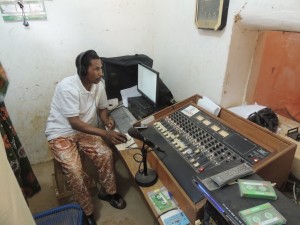That’s the title of a piece I had in the Chronicle of Higher Education in February. CHE is paywalled, but they kindly agree to let me republish here, after a suitable interval. The article (or at least a near final version) is over the fold.
What are the merits of an official language that is no one’s mother tongue?
I asked myself that question on a recent trip to Mali, where French is the one and only official language of the country. French is the language of instruction from elementary through graduate school, the language of court proceedings and official documents. But according to linguists, Mali has no less than 66 languages spoken across its vast plain.
The result is that in addition to one’s native language, whether that be Bambara, Fulani or otherwise, French is spoken by any Malian with any significant level of education. Unfortunately, that is not an overwhelming percentage of the population: as projected by UNESCO, 62 percent of Malians are illiterate, and only 39.5 percent have enrolled in school beyond primary education. The official language of the homeland is thus incomprehensible and inaccessible to these many people.
Many Malians have assured me that there is an upside to their official language: it is predictable and uniform, without favoring one native language or local group over another. To be sure, French is the language of Mali’s colonial past: France governed Mali as a colony from 1892 to 1960, when Mali and France agreed peacefully to Mali’s independence. While one might assume that this translates into present-day resentment, in Mali, yesterday’s colonizer is today’s ally: in January 2013, the French led a military campaign called Operation Serval to stop Islamist rebels aiming to take over the country. According to a poll conducted by the Friedrich Ebert Foundation in February 2013, 97 percent of Malians approved of the French intervention.
So perhaps an official non-native language is a useful thing. Nonetheless, the problem of illiteracy and inaccessibility remains. For these reasons, the role of local news organizations broadcasting in local languages is vital. In Douentza, where we work, the local public radio station broadcasts the day’s news in Fulani- the most widely spoken language in the area- daily at 6 p.m. Founded in 1993, Rural Radio Daande Douentza was originally founded to provide local residents with information about politics, democracy, and rights. In addition, the station offers programming on health, agricultural work, the environment, social issues, local and international news, local announcements and plenty of local and national music.
One official language and lots of Radio Daandes? Seems like a workable arrangement.
“This is the thrilling romance of Orthodoxy. People have fallen into a foolish habit of speaking of orthodoxy as something heavy, humdrum, and safe. There never was anything so perilous or so exciting as orthodoxy.” – G.K. Chesterton
Long post, hastily hammered. I’m hammering, specifically, a Rod Dreher post, since (I admit) I have become quite addicted to watching him chew the theological scenery re: the Indiana stuff. But, in criticizing, I’m not just piling on with more pizza parlor people snark, I hope. I think he’s confused, but what he says does raise interesting issues. I will attempt to be only mildly sarcastic around the edges, in the hopes of good conversation all round.
Dreher writes: [click to continue…]